Gardening in Port Melbourne: Cultivating Green Spaces by the Bay
Introduction to Gardening in Port Melbourne
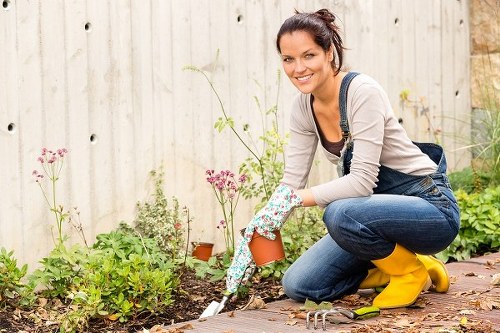
Port Melbourne, a vibrant suburb located along the picturesque coastline of Melbourne, offers a unique environment for gardening enthusiasts. With its temperate climate, abundant sunshine, and proximity to the bay, residents here enjoy the perfect conditions to create and nurture lush green spaces.
Whether you’re an experienced gardener or a novice looking to start your first garden, Port Melbourne provides a supportive community and a wealth of resources to help your garden thrive. From local nurseries to community gardens, the area is well-equipped to assist gardeners in achieving their green dreams.
This article delves into the essentials of gardening in Port Melbourne, offering tips, insights, and resources to help you cultivate a beautiful and sustainable garden.
Climate and Soil Conditions
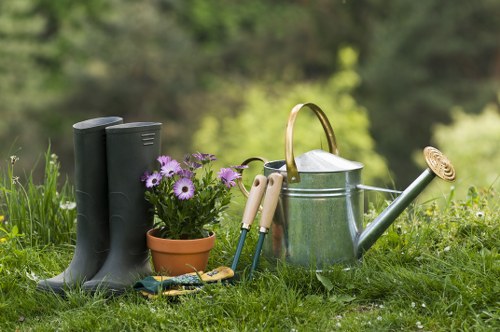
The climate in Port Melbourne is classified as oceanic, characterized by mild, wet winters and warm, dry summers. This climate is ideal for a wide variety of plants, including native Australian species and exotic varieties that thrive in similar conditions.
Understanding the local soil conditions is crucial for successful gardening. The soil in Port Melbourne tends to be sandy with good drainage, which is perfect for plants that require well-aerated roots. However, sandy soils can sometimes lack essential nutrients, so incorporating organic matter like compost can enhance fertility and structure.
Gardeners should conduct a soil test to determine pH levels and nutrient content. Most plants prefer a slightly acidic to neutral pH, but specific plants may have different requirements. Adjusting the soil accordingly can lead to healthier and more productive gardens.
Popular Plants for Port Melbourne Gardens
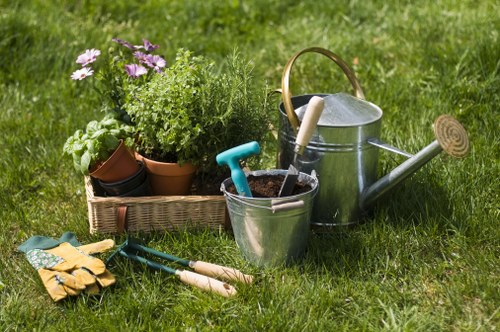
Choosing the right plants is key to a thriving garden. In Port Melbourne, gardeners can take advantage of diverse plant options suited to the local climate and soil. Here are some popular choices:
- Native Australian Plants: Species like Kangaroo Paw, Bottlebrush, and Grevillea are not only beautiful but also well-adapted to the local environment.
- Succulents and Cacti: These drought-tolerant plants are perfect for low-maintenance gardens and add unique textures and shapes.
- Herbs and Vegetables: Growing your own herbs and vegetables can be rewarding and sustainable. Consider basil, rosemary, tomatoes, and lettuce.
- Flowering Annuals and Perennials: Plants like petunias, marigolds, and lavender provide vibrant colors and long blooming periods.
Incorporating a mix of these plants can create a balanced and aesthetically pleasing garden that thrives throughout the year.
Additionally, consider incorporating native grasses and wildflowers to promote biodiversity and support local wildlife, including pollinators like bees and butterflies.
Garden Design and Layout
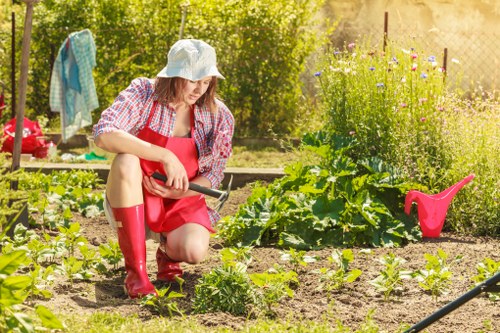
Designing your garden layout is an essential step in creating a functional and beautiful outdoor space. Here are some tips to help you plan effectively:
- Assess Your Space: Take note of the size, shape, and sunlight exposure of your garden area. Understanding these factors will help you choose appropriate plants and design elements.
- Create Zones: Divide your garden into different zones based on their function, such as seating areas, vegetable patches, and flower beds. This organization can enhance both functionality and aesthetics.
- Incorporate Paths: Adding pathways made of stone, gravel, or wood can improve accessibility and add visual interest to your garden.
- Use Vertical Space: Utilize trellises, pergolas, and vertical planters to maximize space, especially in smaller gardens.
- Choose a Focal Point: A feature like a water fountain, sculpture, or a large tree can serve as a focal point, drawing attention and adding character to your garden.
Remember to balance different elements and consider the maintenance requirements of each area during the design process.
Additionally, incorporating sustainable practices such as rainwater harvesting and composting can make your garden more eco-friendly and reduce maintenance efforts.
Maintaining Your Garden
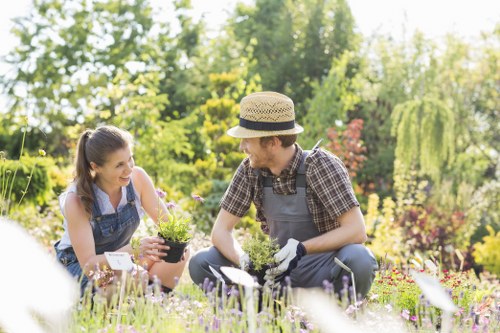
Regular maintenance is essential to keep your garden healthy and vibrant. Here are some key maintenance tasks to consider:
- Watering: Ensure your plants receive adequate water, especially during dry spells. Drip irrigation systems can provide efficient and consistent watering.
- Weeding: Remove weeds regularly to prevent them from competing with your plants for nutrients and water.
- Pruning and Trimming: Regular pruning helps maintain plant shape, encourages growth, and removes dead or diseased branches.
- Fertilizing: Supplement the soil with organic or synthetic fertilizers to provide necessary nutrients for plant growth.
- Pest Control: Monitor your garden for pests and diseases, and take appropriate measures to manage them using eco-friendly solutions when possible.
Implementing a consistent maintenance routine will ensure that your garden remains healthy and continues to enhance the beauty of your Port Melbourne property.
Additionally, consider seasonal tasks such as mulching in the spring to retain soil moisture and protect plant roots during hot months.
Local Gardening Resources and Communities
Gardening in Port Melbourne is supported by a range of local resources and vibrant community groups. Engaging with these resources can provide valuable knowledge and support for your gardening endeavors.
- Local Nurseries and Garden Centers: Visit nearby nurseries to find a wide selection of plants, tools, and gardening supplies tailored to the local climate.
- Community Gardens: Participating in community gardens can offer hands-on experience, social interaction, and access to shared resources.
- Workshops and Classes: Attend gardening workshops and classes offered by local organizations to learn new techniques and stay updated on best practices.
- Online Forums and Social Media Groups: Join online communities where local gardeners share tips, advice, and experiences.
Connecting with fellow gardeners can inspire new ideas and provide assistance when facing gardening challenges.
Additionally, local government websites often have information on gardening regulations, pest control guidelines, and environmental initiatives that can benefit your gardening practices.
10-15 Closest Areas to Port Melbourne for Gardening Services
- St Kilda: Just north of Port Melbourne, St Kilda offers numerous gardening services and community gardens, perfect for those seeking professional assistance.
- South Melbourne: Known for its lush parks and gardens, South Melbourne provides excellent resources and nurseries for gardening enthusiasts.
- Albert Park: With its scenic gardens and botanical gardens, Albert Park is a great area for inspiration and gardening services.
- Middle Park: This suburb offers a variety of landscaping services and access to local gardening clubs.
- Elwood: Elwood boasts beautiful coastal gardens and a range of gardening supply stores.
- Balaclava: Close to bustling markets, Balaclava is ideal for finding unique plants and gardening materials.
- Brunswick: A bit further north, Brunswick provides extensive gardening services and community initiatives.
- Fitzroy: Known for its vibrant community, Fitzroy offers creative gardening solutions and sustainable practices.
- Carlton: Carlton is home to numerous botanical gardens and educational gardening programs.
- South Yarra: With its upscale garden centers and landscape designers, South Yarra caters to high-end gardening needs.
- Prahran: Prahran offers diverse gardening services, including urban gardening and rooftop gardens.
- West Melbourne: Close to industrial areas, West Melbourne provides unique gardening opportunities and local services.
- Williamstown: A coastal suburb like Port Melbourne, Williamstown has excellent resources for seaside gardening.
- Footscray: Footscray offers a multicultural approach to gardening, with diverse plant varieties and community support.
- North Melbourne: With its proximity to the city, North Melbourne provides convenient access to gardening supplies and services.
Each of these areas offers its unique features and resources, making them excellent options for residents of Port Melbourne seeking gardening services and community connections.
Exploring these nearby suburbs can expand your gardening network and provide access to specialized services tailored to your specific gardening needs.
Sustainable Gardening Practices
Embracing sustainable gardening practices not only benefits the environment but also enhances the resilience and health of your garden. Here are some strategies to implement sustainability in your gardening routine:
- Rainwater Harvesting: Collecting rainwater reduces reliance on municipal water supplies and provides plants with natural, chemical-free water.
- Composting: Composting organic waste enriches the soil, improves structure, and promotes beneficial microorganisms.
- Mulching: Applying mulch helps retain soil moisture, suppress weeds, and regulate soil temperature.
- Permaculture Principles: Designing your garden based on natural ecosystems promotes biodiversity and sustainability.
- Organic Pest Control: Using natural predators, neem oil, and other organic methods can effectively manage pests without harmful chemicals.
Incorporating these practices can lead to a more sustainable and eco-friendly garden that supports local wildlife and reduces your environmental footprint.
Additionally, selecting drought-tolerant plants and reducing lawn areas can further enhance the sustainability of your garden.
Gardening for Mental Health and Wellbeing
Gardening offers numerous mental health benefits, making it a therapeutic and rewarding pastime. Engaging in gardening activities can:
- Reduce Stress: Tending to plants and being in nature can lower cortisol levels and alleviate stress.
- Enhance Mood: Exposure to sunlight and the satisfaction of nurturing growth can improve overall mood and combat depression.
- Boost Physical Health: Gardening involves physical activity that enhances strength, flexibility, and cardiovascular health.
- Promote Mindfulness: Focusing on gardening tasks encourages mindfulness and a sense of presence.
- Foster Community Connections: Participating in community gardens and gardening groups can build social connections and reduce feelings of isolation.
Creating a garden space that nurtures both plants and the gardener can lead to improved mental and physical wellbeing.
Additionally, incorporating elements like seating areas and water features can enhance the relaxing and therapeutic aspects of your garden.
Seasonal Gardening Tips
Spring Gardening
Spring is the ideal time to prepare your garden for the growing season. Key activities include:
- Soil Preparation: Amend the soil with compost and organic matter to provide nutrients for new plant growth.
- Planting: Start planting spring-flowering bulbs and early vegetables like peas and lettuce.
- Pruning: Trim back any dead or damaged branches to promote healthy growth.
Summer Gardening
Summer gardening focuses on maintaining plant health during the warmer months. Important tasks include:
- Watering: Ensure consistent watering, especially during dry spells. Early morning or late evening watering is best to reduce evaporation.
- Mulching: Apply mulch to retain soil moisture and keep roots cool.
- Pest Control: Monitor for pests and diseases, and take action as needed.
Autumn Gardening
Autumn is a time for harvesting and preparing for the winter. Key activities include:
- Harvesting: Collect ripe vegetables and fruits before the first frost.
- Planting Perennials: Add hardy perennials to your garden to bloom next spring.
- Leaf Management: Rake fallen leaves and use them as mulch or compost material.
Winter Gardening
During winter, focus on protecting your garden and planning for the next year. Important tasks include:
- Tool Maintenance: Clean and store gardening tools to prolong their lifespan.
- Planning: Design your garden layout for the upcoming season and order seeds.
- Protective Measures: Use frost covers or cold frames to protect sensitive plants from extreme weather.
Adapting your gardening practices to the changing seasons ensures a healthy and productive garden year-round.
Additionally, taking advantage of seasonal resources and local planting calendars can optimize your gardening efforts.
Conclusion: Embrace the Garden Lifestyle in Port Melbourne
Gardening in Port Melbourne offers a fulfilling way to connect with nature, enhance your living space, and contribute to the community. With its favorable climate, diverse plant options, and supportive local resources, Port Melbourne is an ideal place for both novice and experienced gardeners.
By understanding the local conditions, selecting appropriate plants, and implementing sustainable practices, you can create a thriving garden that brings beauty and joy throughout the year.
Ready to transform your outdoor space? Contact us today to start your gardening journey in Port Melbourne and enjoy the countless benefits of a well-tended garden.
